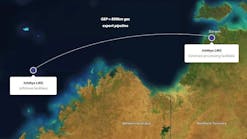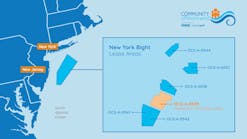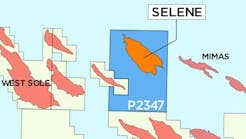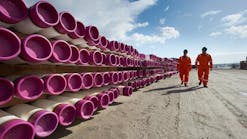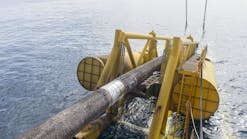"It could have been better," was the response from an official representing India's Directorate General of Hydrocarbons regarding the bids for the country's first licensing round under the new exploration licensing policy (NELP). The country placed 48 blocks on offer for licensing earlier this year. Ten of the blocks were onshore, 26 in the shallow water, and 12 in deepwater. However, after extending the deadline due to low interest, the round finally closed with 45 bids for 27 of the 48 blocks.
India's licenses on offer under the NELP. Only 27 of the 48 licenses received bids.
Bids were submitted for four of the onshore blocks, 16 of the shallow water, and seven in the deepwater. While it hoped to attract the majors with incentives to invest, India only had 10 international firms submit bids. Large players such as Shell, Mobil, Chevron, and Unocal stayed out of the bidding.
While this may be a bit disappointing for a first time event, the timing of the round did coincide with low oil prices and if a big strike is made, many of those who passed this time will likely re-evaluate decisions.
Deepwater success off Western Australia
A joint venture including such partners as Texaco and Chevron, has hit pay dirt with their first exploratory well in WA-267-P offshore Western Australia. Operating under the name West Australian Petroleum Pty. Limited (WAPET), the international group spudded the Geryon No. 1 well on the lease in 1,232 meters of water with the upgraded Marine 500 deepwater semisubmersible. The well reached a total depth of 3,515 meters and initial results indicated a world-class gas discovery. The well encountered hydrocarbon gas pay in three high quality reservoir zones with a total net gas pay of 113 meters over a 242 meter gross interval. This equates to what the companies estimate is "multiple tcf."
The new field is located west of WAPET's Gorgon, West Tryal Rocks, Spar, Chrysaor, and Dionysus gas fields, which have proven estimated total reserves of 21.5 tcf. This new field has been considered as possibly an extension of the Gorgon gas field.
Geryon No. 1 is the first of a six-well program the company's have planned in the permit. The second well, Orthrus-1, is currently in progress using the Marine 500 and is targeting a separate structure within the area.
WAPET has contracted the rig for eight wells over the next two years. The total drilling campaign will cost between A$160-200 million. The remaining four wells on the permit are planned for next year. The rig is also scheduled to drill in Indonesia and then return to Australia to drill a single well on the WA-25-P exploration permit northwest of Barrow Island.
International joint venture WAPET has added to its Western Australian gas reserves with a massive find in the deepwater WA-267-P exploration permit.
Development of the new field and the existing fields is currently tentative. Texaco, one of the major partners, announced a major domestic gas marketing initiative early this year. The goal of the initiative is to supply high volume industrial gas users in Western Australia with gas from the fields. However, the company has estimated that current demand will need to double in order to make development viable. Some of the partners in WAPET, Shell, Chevron, and BP Amoco, are also partners in the A$12 billion North West Shelf joint venture - Australia's only LNG plant. WAPET consists of Texaco, Chevron, Mobil, Shell, and BP Amoco. The group was awarded WA-267-P in mid-1997.
China's CNOOC planning IPO
CNOOC has decided to go public. Chinese National Offshore Oil Corp, the largest offshore oil and gas producing company offshore China and one of the largest in the world, has filed with the US Securities and Exchange Commission to raise up to $2.3 billion in an initial public offering (IPO) of American depository shares.
The company plans to use the proceeds from the sale to repay debt, for use in general corporate purposes, to fund future development expenditures, and to fund future exploration costs and acquisition opportunities. The company has announced plans to invest around $2.2 billion through 2002 to develop its proved reserves.
As of June, the company had net proved reserves of 1.7 billion boe, 67% of which were crude oil and natural gas liquids with the remaining being natural gas. Following the trade, CNOOC will indirectly own 75% of the outstanding shares.
In addition to the offering, CEO of CNOOC Wei Liucheng has signed a joint operation agreement with Phillips China for the Xijiang oil field during his visit to the US. Xijiang, located in the Pearl River Mouth in the South China Sea was explored and developed by Phillips and CNOOC. They reached a consensus on revising the original contract, which has Phillips as operator, into a joint operation group. Both CNOOC and Phillips will each hold a 50% share of the field and the exploration and development costs.
In other China offshore news, CNOOC has discovered the Penglai 19-3 oil field in the southern part of the Bohai Sea. Reserves for the field have been estimated at over 100 million tons of oil and represents the largest of four oil fields discovered in Bohai.
Norway offers help to the Philippines
Norway has offered to lend its hand to the Philippines to help identify potential oil areas. The Norwegian Agency for Development and Cooperation has signed a memorandum of agreement to provide $720,000 for the financing of a petroleum resource assessment project of the Philippines petroleum resources. In addition the project will develop a petroleum resource classification system and a technology transfer for resource assessment.
Unocal's Trat onstream
Unocal has begun production from its Trat Field in the Gulf of Thailand. The field in Block 11 has begun producing 70 MMcf/d of gas and 2,100 b/d of condensate from five wells.
The company plans to install three additional well platforms in the area and is currently producing from the Trat-A platform, which has accommodations for 18 wells. Notably, Trat is also producing from the Trat A-07 well, Unocal's first horizontal well in the Gulf of Thailand. Unocal is the operator with 71.25% working interest. Mitsui Oil and PTT also holds shares of 23.75% and 5%, respectively.
